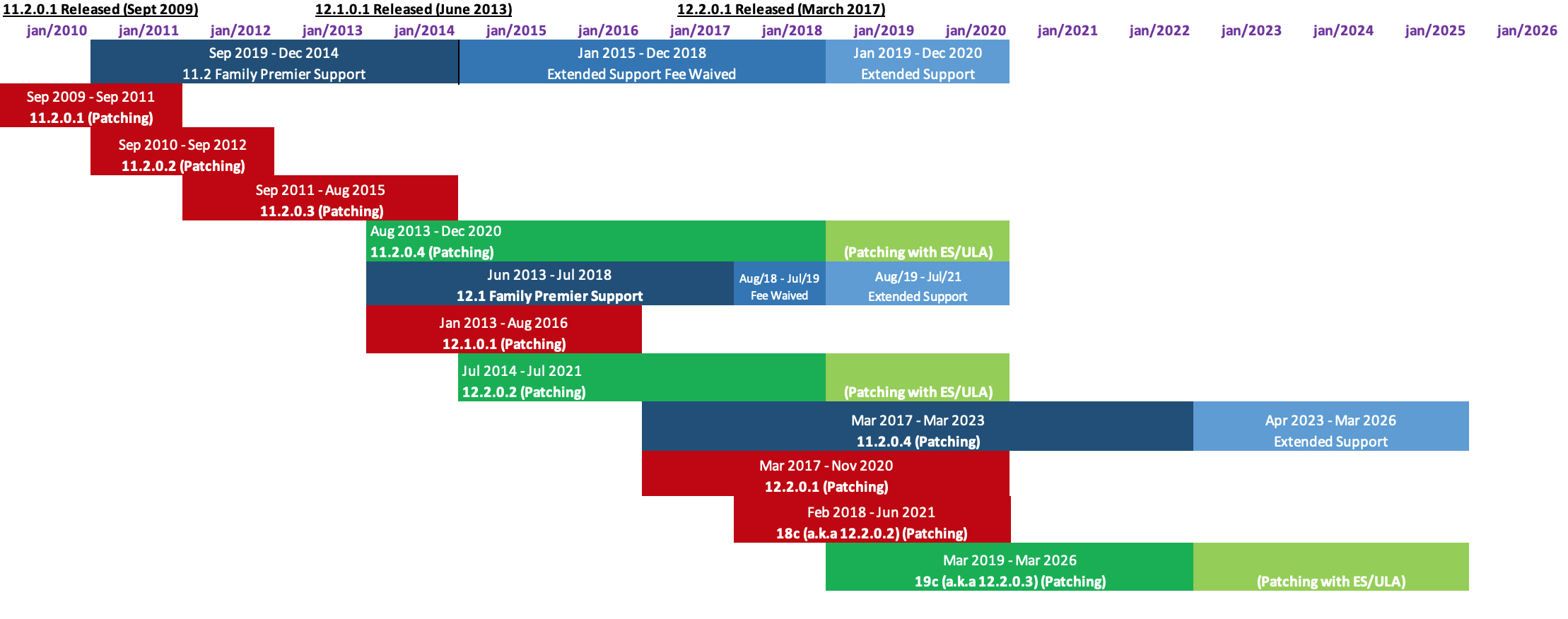Stop Migrating Databases to 12c!
If you are starting an upgrade plan, do it directly to Oracle Database 19c. Why? Well, let’s agree that 19c is “equivalent” to 12.2.0.3 on previous version models, and 18c would be 12.2.0.2, after the latest in the old format: 12.2.0.1. So, thinking reasonably, you would already plan for latest PSU on the future version, right? Well,
this is 19c. But not only this: it’s well known that Oracle’s Terminal Patchset is the Long Term Release for each version. And for the 12.2 family,
this is 19c. The image below should help to clarify this:
 In summary, since August 1, 2019: – 11.2.0.4 is already on Extended Support (20% more expensive unless you have ULA) – 12.1 family is already on Extended Support (20% more expensive unless you have ULA) Which only leave us with the 12.2 family. Now I ask you, why jump to any “PSU” other than the final one? Also, support on 12.2.0.1 goes only until Nov 2020 and for 18c (12.2.0.2) only until June 2021, while 19c goes up to 2026 with ES/ULA! I’m not even raising the great improvements we have on newer versions (if you are in 11.2, shame on you, you are basically six years behind the world, technology-wise). I have already migrated several databases on different clients to 19c and it’s running preeeetty fine. So trust it! Ok, so migrating to 19c? Here are some tips: – To migrate directly to 19c, you need to be on a supported terminal patch set (11.2.0.4, 12.1.0.2) or on 12.2 family (12.2.0.1, 18c). – Get in touch and use the AutoUpgrade mechanism (you’ll love it!) –
AutoUpgrade Tool (Doc ID 2485457.1) –
Check Upgrade Guide – Have a look at
Mike Dietrich blog for news. – Test it before doing in production.
Additional reference:
Release Schedule of Current Database Releases (Doc ID 742060.1) Count on Pythian to help you along this process!
In summary, since August 1, 2019: – 11.2.0.4 is already on Extended Support (20% more expensive unless you have ULA) – 12.1 family is already on Extended Support (20% more expensive unless you have ULA) Which only leave us with the 12.2 family. Now I ask you, why jump to any “PSU” other than the final one? Also, support on 12.2.0.1 goes only until Nov 2020 and for 18c (12.2.0.2) only until June 2021, while 19c goes up to 2026 with ES/ULA! I’m not even raising the great improvements we have on newer versions (if you are in 11.2, shame on you, you are basically six years behind the world, technology-wise). I have already migrated several databases on different clients to 19c and it’s running preeeetty fine. So trust it! Ok, so migrating to 19c? Here are some tips: – To migrate directly to 19c, you need to be on a supported terminal patch set (11.2.0.4, 12.1.0.2) or on 12.2 family (12.2.0.1, 18c). – Get in touch and use the AutoUpgrade mechanism (you’ll love it!) –
AutoUpgrade Tool (Doc ID 2485457.1) –
Check Upgrade Guide – Have a look at
Mike Dietrich blog for news. – Test it before doing in production.
Additional reference:
Release Schedule of Current Database Releases (Doc ID 742060.1) Count on Pythian to help you along this process!
 In summary, since August 1, 2019: – 11.2.0.4 is already on Extended Support (20% more expensive unless you have ULA) – 12.1 family is already on Extended Support (20% more expensive unless you have ULA) Which only leave us with the 12.2 family. Now I ask you, why jump to any “PSU” other than the final one? Also, support on 12.2.0.1 goes only until Nov 2020 and for 18c (12.2.0.2) only until June 2021, while 19c goes up to 2026 with ES/ULA! I’m not even raising the great improvements we have on newer versions (if you are in 11.2, shame on you, you are basically six years behind the world, technology-wise). I have already migrated several databases on different clients to 19c and it’s running preeeetty fine. So trust it! Ok, so migrating to 19c? Here are some tips: – To migrate directly to 19c, you need to be on a supported terminal patch set (11.2.0.4, 12.1.0.2) or on 12.2 family (12.2.0.1, 18c). – Get in touch and use the AutoUpgrade mechanism (you’ll love it!) –
AutoUpgrade Tool (Doc ID 2485457.1) –
Check Upgrade Guide – Have a look at
Mike Dietrich blog for news. – Test it before doing in production.
Additional reference:
Release Schedule of Current Database Releases (Doc ID 742060.1) Count on Pythian to help you along this process!
In summary, since August 1, 2019: – 11.2.0.4 is already on Extended Support (20% more expensive unless you have ULA) – 12.1 family is already on Extended Support (20% more expensive unless you have ULA) Which only leave us with the 12.2 family. Now I ask you, why jump to any “PSU” other than the final one? Also, support on 12.2.0.1 goes only until Nov 2020 and for 18c (12.2.0.2) only until June 2021, while 19c goes up to 2026 with ES/ULA! I’m not even raising the great improvements we have on newer versions (if you are in 11.2, shame on you, you are basically six years behind the world, technology-wise). I have already migrated several databases on different clients to 19c and it’s running preeeetty fine. So trust it! Ok, so migrating to 19c? Here are some tips: – To migrate directly to 19c, you need to be on a supported terminal patch set (11.2.0.4, 12.1.0.2) or on 12.2 family (12.2.0.1, 18c). – Get in touch and use the AutoUpgrade mechanism (you’ll love it!) –
AutoUpgrade Tool (Doc ID 2485457.1) –
Check Upgrade Guide – Have a look at
Mike Dietrich blog for news. – Test it before doing in production.
Additional reference:
Release Schedule of Current Database Releases (Doc ID 742060.1) Count on Pythian to help you along this process!

